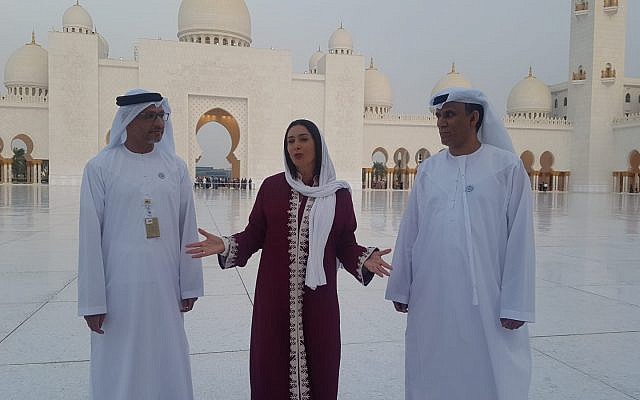In first, Israeli minister makes state visit to Grand Mosque in Abu Dhabi
Miri Regev says house of worship ‘has a message of brotherhood and peace,’ a day after Israeli national anthem is played at judo tourney in the city
Israel’s culture and sports minister paid a state visit to the largest mosque in the United Arab Emirates on Monday, part of a historic trip that some have seen as signaling a slow rapprochement between Abu Dhabi and Jerusalem.
Miri Regev visited Abu Dhabi’s Sheikh Zayed Grand Mosque accompanied by officials from the UAE, touring the the Muslim world’s third largest house of worship, after mosques in Mecca and Medina.
Regev is in the country to watch the Israeli judoka team compete at the Abu Dhabi Grand Slam, which they are doing for the first time ever in an Arabian Gulf state under their national flag, after the UAE acceded to pressure from international sports officials.
“This mosque has a message of brotherhood and peace,” Regev wrote in the visitor’s book, in Hebrew. “I wish a good life and peace for all.”
In a Hebrew-language video posted to social media, Regev extolled the “wonderful opportunity” she had to visit the religious site, which she said sends a message of peace and unity.
The visit came a day after Regev was moved to tears as Israel’s national anthem was played at the judo tournament for Sagi Muki, who won gold in the under-81 kilogram category at the Abu Dhabi Grand Slam.
A year earlier, tournament organizers in Abu Dhabi had banned Israel’s flag and national anthem — a policy directed only at Israeli participants. Tal Flicker won a gold at the tournament, but the anthem was not played, so he sang it himself.
Israeli athletes competing in international tournaments hosted by Arab countries have generally not been allowed to compete under their national flag, display national symbols on their uniforms or have their anthem played, despite protests by Israel and international officials.
The International Judo Federation had threatened to take the tournament away from Abu Dhabi if it did not let Israelis compete under their flag, leading to the sea change.
“It is a dream come true,” Regev said after the ceremony. “For two years we had talks in order to reach this moment and it was hard to stop the tears. I want to thank the authorities in Abu Dhabi and our hosts here who received us in an exemplary manner.”
Israeli officials cheered the victory with messages of pride and congratulations posted to their Twitter accounts and Prime Minister Benjamin Netanyahu called Muki to congratulate him.
Regev’s trip to the UAE, which began on Thursday, coincided with Netanyahu’s visit to neighboring Oman, the first for an Israeli leader since 1996.
On the same day, an Israeli gymnastics delegation was in Qatar for the beginning of the world championships being held in Doha.
And on Monday, Communications Minister Ayoub Kara was to travel to Dubai to represent Israel at an international internet security conference, his office said.
Israel currently has full diplomatic relations with only two Arab states, Egypt and Jordan.
Netanyahu has long sought a rapprochement with other Arab states.
Israel’s control of the West Bank, however, remains a major obstacle to official recognition from Arab countries.
